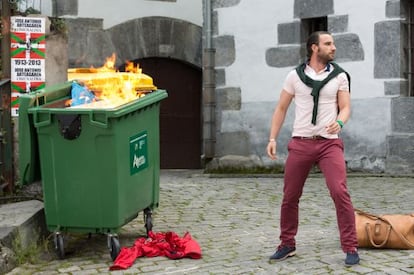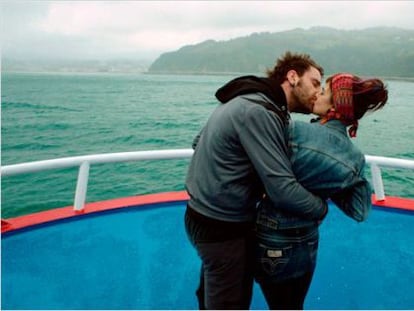Basque-ing in box-office glory
With record takings and applause after each showing, ‘Ocho apellidos vascos’ is a film phenomenon

Nine o’clock on a Wednesday night, at the box office of a central Madrid cinema.
– One for Ocho apellidos vascos. Excuse me, is it sold out?
– No. But it will be.
The cashier’s prediction is by no means a crazy one. Ocho apellidos vascos, director Emilio Martínez Lázaro’s comedy about an Andalusian trying to pass himself off as Basque, has been destroying everything in its wake at the Spanish box office over the last two weeks, with takings now standing at €10 million. One-and-a-half hours later, there is the odd empty seat inside, but there are enough people present to provide a constant soundtrack of cackles. And at the end, like in other cinemas across Spain, applause, as if we were in a theater rather than a movie house.
The film has worked particularly well in the Basque Country; on some days in Bilbao it has sold out on every screen. Produced by TV station Telecinco and written by Borja Cobeaga and Diego San José, writers of hit Basque comedy series ¡Vaya semanita!, the movie has attracted all kinds of different audiences.
Basques have always laughed about these things, but in private, which is where the difference is”
The director puts its success down to the fact that it goes further than others have dared. “It breaks the taboo of talking about feelings of identity as if they were sacred, something identified with religion,” says Martínez Lázaro.
“Basques have always laughed about these things, but in private. And that is exactly where the difference is,” says Basque writer Kirmen Uribe.
At a time when audiences are deserting cinemas in their droves, this oddball tale of a romance between a slick-haired Andalusian and a feisty Basque has catapulted more than a million-and-a-half people into theaters. “During filming, Emilio Martínez Lázaro told us that he was clear about aiming at an audience of between seven and 70 years old,” explains Telecinco Cinema head Álvaro Augustin.
Since its release, the comedy, which stars Dani Rovira, Clara Lago, Karra Elejalde and Carmen Machi, has not dropped out of the list of top-15 highest-grossing films around the world. Obviously a sequel, which Telecinco Cinema had been considering since the shoot, is already in the works: “Borja offered us a clear storyline,” says Augustin, “and that is the possible basis of the new script.”
“Diego and I,” Cobeaga explains, “have another film in preproduction for them, and I think that this success is going to push that to one side, and that we will have to focus on this second part, which – why not? – might even serve as the launchpad for a franchise about stereotypes.”
How does a success like this come about? With a clear idea, a good script and director, a strong launch, and luck, says Augustin. When Telecinco released J. A. Bayona’s tsunami-drama The Impossible – the highest-grossing Spanish film to date – in 2012, Patricia Marco, channel director at Mediaset España, which owns Telecinco, was heard saying “promotion doesn’t kill anyone,” and as such publicized the movie across seven channels: “We reached a 1,800 GRP on Telecinco, when the average might be 500 or 550.” GRPs, or Gross Rating Points, are the units used in advertising planning to measure the accumulated impact of a spot over time on the target audience. Ocho apellidos vascos did not quite reach those levels, but it came close. “Despite how it might appear because of the current times, people want to laugh,” Augustin adds.
It’s clear that if ETA was still killing, this film would not have been made”
Cobeaga takes the point further: “We have forgotten the about the attraction of seeing a comedy in a full cinema and what drives audiences to recommend it: the collective experience is addictive, it has a domino effect.”
Even when the jokes are about the violence in the Basque Country? “It depends on the joke, but both Diego and I come from the program ¡Vaya semanita! and Diego always emphasizes that society is further ahead than we think. There was a gap there, for a satire about stereotypes, that we have exploited.”
“The ETA ceasefire has helped,” says Kirmen Uribe.
“It’s clear that if [ETA] was still killing, this film would not have been made,” agrees Emilio Martínez-Lázaro.
Just how far can the film go at the box office? This week, Captain America: The Winter Soldier is released, a tough rival, but on Monday the Fiesta del Cine promotion returns, offering reduced-price tickets at cinemas across Spain over three days. In the industry they are talking about final box-office earnings of around €25 million for a comedy that has already changed Spanish cinema history.
Tu suscripción se está usando en otro dispositivo
¿Quieres añadir otro usuario a tu suscripción?
Si continúas leyendo en este dispositivo, no se podrá leer en el otro.
FlechaTu suscripción se está usando en otro dispositivo y solo puedes acceder a EL PAÍS desde un dispositivo a la vez.
Si quieres compartir tu cuenta, cambia tu suscripción a la modalidad Premium, así podrás añadir otro usuario. Cada uno accederá con su propia cuenta de email, lo que os permitirá personalizar vuestra experiencia en EL PAÍS.
¿Tienes una suscripción de empresa? Accede aquí para contratar más cuentas.
En el caso de no saber quién está usando tu cuenta, te recomendamos cambiar tu contraseña aquí.
Si decides continuar compartiendo tu cuenta, este mensaje se mostrará en tu dispositivo y en el de la otra persona que está usando tu cuenta de forma indefinida, afectando a tu experiencia de lectura. Puedes consultar aquí los términos y condiciones de la suscripción digital.










































